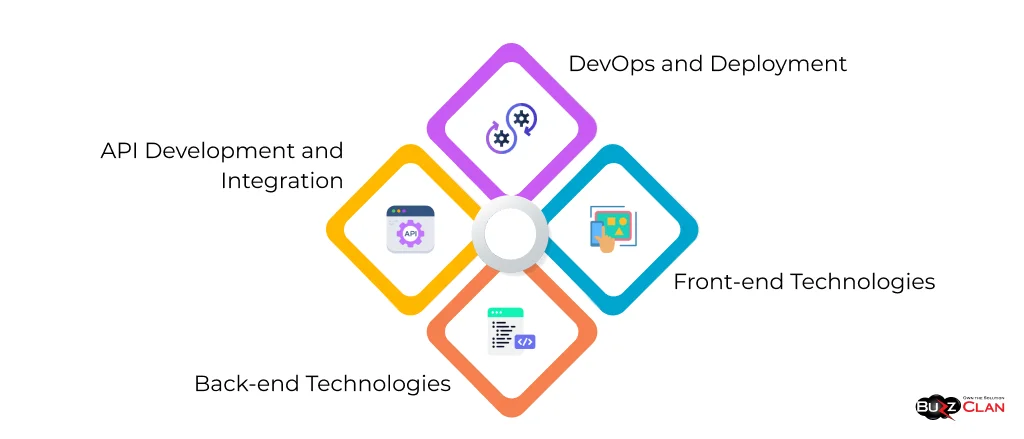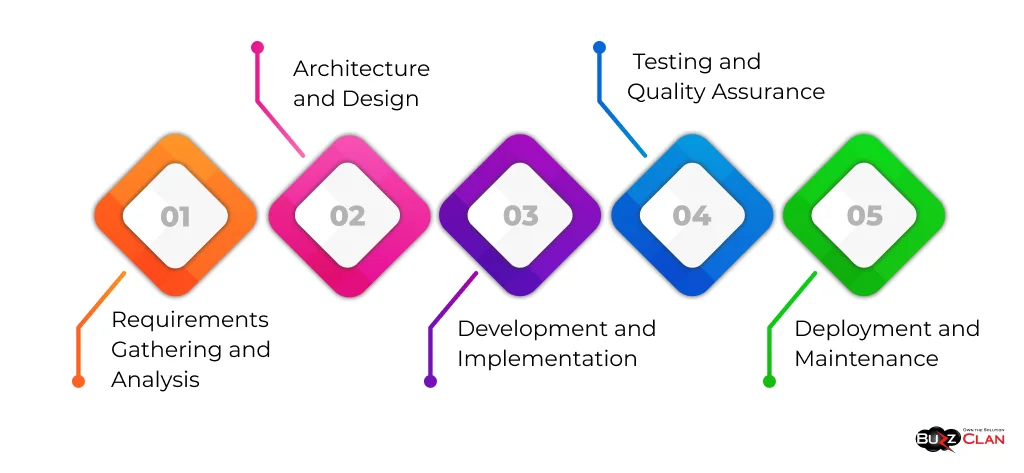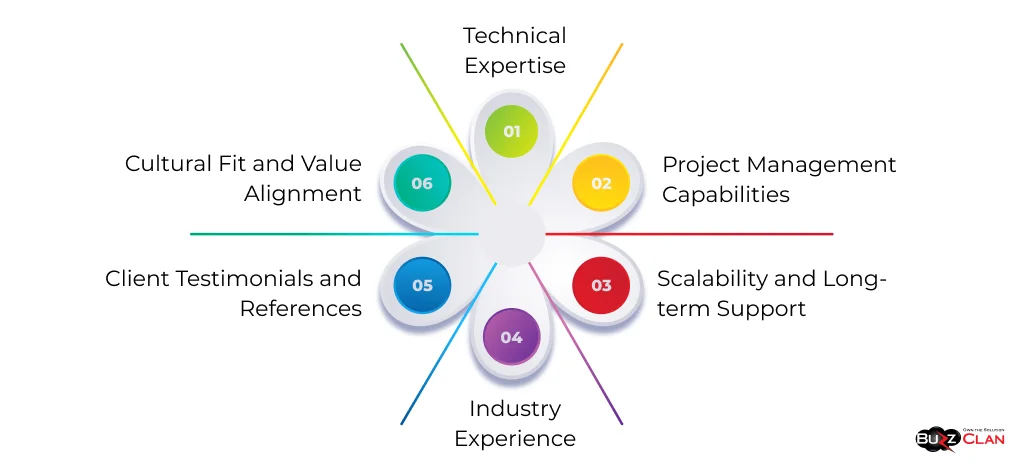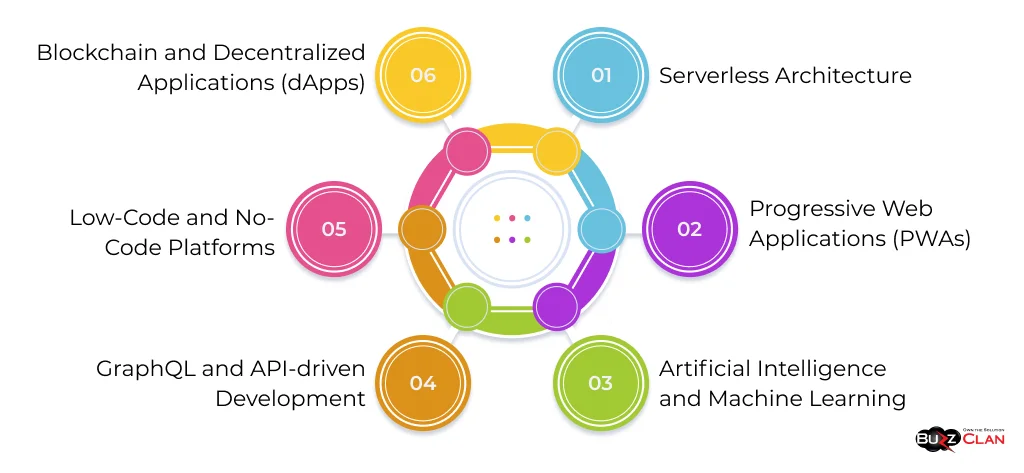The Ultimate Guide to Full Stack Development for Business Success
Arjun Patel
May 24, 2024
Introduction
In today's rapidly evolving digital landscape, businesses are increasingly seeking comprehensive and efficient solutions to their software development needs. Full-stack development has emerged as a powerful approach that addresses this demand by providing end-to-end development services. At BuzzClan, we understand the importance of leveraging full-stack development to deliver robust, scalable, and user-friendly applications that drive business growth.
Full stack development is a holistic approach to software development that encompasses both front-end and back-end technologies. It goes beyond the traditional separation of client-side and server-side development, allowing developers to work seamlessly across the entire technology stack. By offering full-stack development services, our company aims to provide businesses with a one-stop solution that streamlines the development process, reduces time to market, and ensures the delivery of high-quality, feature-rich applications.
In this blog post, we will delve into the world of full-stack development, exploring its definition, benefits, key technologies, and how BuzzClan leverages this approach to deliver exceptional client results. We will also present real-world case studies showcasing the success of our full-stack projects and provide a guide on choosing the right development partner. Finally, we will look at the future trends shaping the landscape of full-stack development.
Understanding Full Stack Development
Full stack development is a comprehensive approach to software development that involves working with both front-end and back-end technologies. It encompasses all technology stack layers, from the user interface and user experience (UI/UX) design to the server-side logic and database management.
A full stack developer possesses a wide range of skills and expertise, allowing them to handle the entire development process from start to finish. They are proficient in front-end technologies such as HTML, CSS, and JavaScript, as well as back-end technologies like server-side programming languages (e.g., Python, Ruby, Java), database management systems (e.g., MySQL, MongoDB), and server operations.
In addition to the core development tasks, full stack developers deeply understand systems engineering principles. They can design and architect scalable and maintainable software solutions, considering performance, security, and reliability factors. Full stack developers collaborate closely with cross-functional teams, including designers, project managers, and quality assurance specialists, to ensure the seamless integration of all components and the delivery of a cohesive final product.
Why Your Business Should Consider Full Stack Development
Employing full stack development offers numerous benefits to businesses looking to develop high-quality software solutions. Here are some key advantages:
| Advantages | Description |
| Enhanced Coordination and Collaboration | Full stack development promotes seamless coordination and collaboration among development teams. With developers possessing a holistic understanding of the entire technology stack, communication gaps are minimized, leading to improved efficiency and faster problem-solving. |
| Reduced Time to Market | Businesses can significantly reduce the time required to bring their software products to market by utilizing full-stack developers. Full-stack developers can work on multiple aspects of the project simultaneously, eliminating the need for handoffs between specialized teams and streamlining the development process. |
| Increased Responsiveness to Market Changes | Full-stack development enables businesses to be more agile and responsive to market dynamics. By quickly adapting and integrating new technologies and features, companies can stay ahead of the competition and meet evolving customer demands. |
| Scalability and Flexibility | Full stack capabilities allow for developing scalable and flexible software solutions. Developers can design and architect systems that can handle increasing user loads and accommodate future growth. This scalability ensures businesses can quickly expand their operations without requiring extensive rework or system overhauls. |
| Seamless Integration | Full stack development facilitates the seamless integration of various technologies and systems. Developers can ensure compatibility and interoperability between different components, resulting in a cohesive and well-functioning application. This integration capability is particularly valuable for businesses with complex ecosystems and diverse technology requirements. |
Full Stack Development Skills and Technologies
Full stack development involves many skills and technologies that enable developers to build end-to-end software solutions. Here are some of the core competencies and technologies commonly utilized in full stack development:

Front-end Technologies:
- HTML: The markup language used for creating the structure and content of web pages.
- CSS: The styling language used for designing the visual presentation of web pages.
- JavaScript: The programming language that adds interactivity and dynamic functionality to web applications.
- Front-end Frameworks: Popular frameworks like React, Angular, and Vue.js streamline front-end development and create responsive user interfaces.
Back-end Technologies:
- Server-side Programming Languages: Full stack developers are proficient in server-side languages such as Python, Ruby, Java, or Node.js. These languages are used to build the backend logic and handle server-side operations.
- Web Frameworks: Frameworks like Django (Python), Ruby on Rails (Ruby), Spring (Java), or Express.js (Node.js) provide a structured approach to building web applications and managing server-side functionality.
- Database Management Systems: Full-stack developers use relational databases (e.g., MySQL, PostgreSQL) and NoSQL databases (e.g., MongoDB, Cassandra) to store, retrieve, and manipulate data.
API Development and Integration:
- RESTful APIs: Full stack developers design and implement RESTful APIs to enable communication between an application's front-end and back-end components.
- API Integration: They possess the skills to integrate third-party APIs and services into the application, enhancing its functionality and interoperability.
DevOps and Deployment:
- Version Control Systems: Full stack developers use version control systems like Git to manage code repositories and collaborate with other team members.
- Continuous Integration and Deployment (CI/CD): They are familiar with CI/CD tools and practices to automate the build, testing, and deployment processes, ensuring fast and reliable software delivery.
- Containerization and Orchestration: Technologies like Docker and Kubernetes package applications into containers and manage their deployment and scaling.
Security and Performance Optimization:
- Security Best Practices: Full stack developers implement security measures such as input validation, authentication, and authorization to protect applications from vulnerabilities and attacks.
- Performance Optimization: They optimize application performance by employing caching, lazy loading, and database indexing to ensure fast and responsive user experiences.
Full-stack developers can master these skills and technologies to create robust, secure, and scalable solutions that meet businesses' diverse needs. BuzzClan has a team of experienced full-stack developers who stay up-to-date with industry trends and best practices to deliver cutting-edge solutions to our clients.
How BuzzClan Implements Full Stack Development
At BuzzClan, we follow a structured approach to implement full stack development projects. Our process is designed to ensure project success, client satisfaction, and the delivery of high-quality software solutions. Here's how we approach full stack development:

Requirements Gathering and Analysis:
- We start by conducting detailed discussions with our clients to understand their business requirements, objectives, and target audience.
- Our team analyzes the project scope, identifies potential challenges, and defines the roadmap.
Architecture and Design:
- Our full-stack developers create a comprehensive application architecture and design plan based on the requirements.
- We consider scalability, performance, security, and maintainability factors while designing the system architecture.
Development and Implementation:
- Our full-stack developers begin the development process, working on the application's front-end and back-end components.
- We utilize Agile methodologies, such as Scrum or Kanban, to ensure iterative development, regular feedback loops, and continuous improvement.
- Our team collaborates closely with clients throughout development, providing regular progress updates and incorporating their feedback.
Testing and Quality Assurance:
- We strongly emphasize testing and quality assurance to ensure the application's reliability and performance.
- Our full-stack developers conduct thorough unit, integration, and end-to-end testing to identify and resolve any issues or bugs.
- We also perform security testing to identify and mitigate potential vulnerabilities.
Deployment and Maintenance:
- Once the application has passed rigorous testing, we deploy it to the production environment using automated deployment processes.
- We ensure smooth deployment and provide post-deployment support to address any issues that may arise.
- Our team offers ongoing maintenance and support services to ensure the long-term stability and performance of the application.
Throughout the development process, we leverage DevOps practices to streamline collaboration, automate processes, and enable continuous integration and deployment. This approach allows us to deliver high-quality software solutions faster and more efficiently.
Case Studies: Successful Full Stack Projects
To showcase the success of our full-stack development approach, let's examine some real-world case studies of projects undertaken by us:
Case Study 1: E-commerce Platform Development
Client: A leading retail company looking to expand its online presence.
Challenge: The client needed a robust and scalable e-commerce platform to handle high traffic volumes and provide a seamless shopping experience to customers.
Solution:
- Our full-stack developers designed and developed a feature-rich e-commerce platform using front-end technologies (React, HTML, CSS) and back-end technologies (Node.js, Express.js, MongoDB).
- To enhance the user experience, we implemented a secure payment gateway integration, inventory management system, and personalized product recommendations.
- The platform was optimized for performance and scalability, ensuring fast page load times and the ability to handle peak traffic during sales events.
Outcome:
- The e-commerce platform significantly increased the client's online sales and customer engagement.
- The scalable architecture allowed the client to handle a 300% increase in traffic during holiday seasons without downtime.
- The client received positive customer feedback regarding the seamless shopping experience and personalized recommendations.
Case Study 2: Mobile Application Development
Client: A healthcare startup aiming to develop a mobile application for remote patient monitoring.
Challenge: The client required a secure and user-friendly mobile application that could integrate with wearable devices and provide real-time health data to healthcare providers.
Solution:
- Our full stack developers created a cross-platform mobile application using React Native, allowing for deployment on both iOS and Android platforms.
- We integrated the application with Bluetooth Low Energy (BLE) to enable seamless connection with wearable devices and ensure accurate data collection.
- The back-end system was developed using Python and Django, with a PostgreSQL database to securely store and manage patient data.
- We implemented encryption mechanisms and followed HIPAA compliance guidelines to ensure the privacy and security of sensitive healthcare information.
Outcome:
- The mobile application empowered patients to monitor their health remotely and share real-time data with their healthcare providers.
- Healthcare providers could make informed decisions and provide timely interventions based on the data collected through the application.
- The client received recognition for their innovative solution and saw a significant increase in user adoption and positive feedback from patients and healthcare providers.
These case studies demonstrate BuzzClan's expertise and value in full stack development projects. We deliver solutions that drive business growth and exceed client expectations by leveraging our technical skills, industry knowledge, and client-centric approach.
Choosing the Right Full Stack Development Partner
Selecting the right full stack development partner is crucial for the success of your software development projects. When evaluating potential partners, consider the following key factors:

Technical Expertise:
- Look for a company with a proven track record of delivering successful full stack development projects.
- Assess their expertise in the technologies and frameworks relevant to your project requirements.
- Consider their ability to handle complex integrations, scalability challenges, and performance optimization.
Project Management Capabilities:
- Evaluate the company's project management methodologies and processes.
- Ensure they have a structured approach to requirements gathering, project planning, and progress tracking.
- Look for a partner who values clear communication, transparency, and collaboration throughout development.
Industry Experience:
- Consider the company's experience in your specific industry or domain.
- Look for a partner who understands your industry's unique challenges and regulations and can provide tailored solutions.
Scalability and Long-term Support:
- Assess the company's ability to scale your application as your business grows.
- Ensure they have the infrastructure and resources to handle increasing user loads and data volumes.
- Consider their offerings for long-term support, maintenance, and future enhancements to your application.
Client Testimonials and References:
- Review client testimonials and case studies to gauge the company's successful project delivery track record.
- Reach out to references provided by the company to gain insights into their experience working with the development team.
Cultural Fit and Value Alignment:
- Consider the company's culture and values to ensure they align with your organization's goals and principles.
- Look for a partner who prioritizes open communication, transparency, and a collaborative approach to problem-solving.
By carefully evaluating these factors, you can select a full stack development partner who possesses the technical expertise, understands your business objectives, and can deliver solutions that drive long-term success.
Future Trends in Full-Stack Development
As technology evolves rapidly, full stack development is also undergoing significant changes. Here are some of the key trends shaping the future of full stack development:

Serverless Architecture:
- Serverless computing is gaining popularity as it allows developers to build and run applications without the need to manage server infrastructure.
- Full-stack developers will increasingly adopt serverless architectures to reduce operational overhead, improve scalability, and achieve cost efficiency.
Progressive Web Applications (PWAs):
- PWAs are web applications that provide a native app-like experience to users, with features such as offline functionality, push notifications, and home screen installation.
- Full stack developers will focus on building PWAs to deliver seamless user experiences across multiple devices and platforms.
Artificial Intelligence and Machine Learning:
- AI and ML technologies are becoming increasingly integrated into full stack applications.
- Full stack developers will leverage AI and ML to build intelligent applications that can provide personalized recommendations, automate tasks, and improve decision-making processes.
GraphQL and API-driven Development:
- GraphQL, a query language for APIs, is gaining traction as an alternative to traditional RESTful APIs.
- Full stack developers will adopt GraphQL to build more efficient and flexible APIs, enabling faster data retrieval and reducing data overfetching.
Low-Code and No-Code Platforms:
- Low-code and no-code platforms are emerging as tools that allow developers to build applications with minimal coding.
- Full stack developers will leverage these platforms to accelerate development processes, particularly for prototyping and building simple applications.
Blockchain and Decentralized Applications (dApps):
- Blockchain technology is revolutionizing various industries, and full stack developers will increasingly work on building decentralized applications (dApps).
- Full-stack developers must acquire skills in blockchain development frameworks and smart contract programming to create secure and transparent dApps.
Conclusion
Full stack development has emerged as a powerful approach to creating comprehensive and efficient software solutions. By leveraging the expertise of full stack developers who possess a wide range of skills across the entire technology stack, businesses can achieve faster time to market, improved scalability, and seamless integration of technologies.
Throughout this blog post, we have explored the definition of full-stack development, its benefits, and the key skills and technologies involved. We have also shared insights into how BuzzClan implements full-stack development projects, showcasing real-world case studies that demonstrate the success of our approach.
Choosing the right development partner is crucial when considering full-stack development for your business. Look for a company with strong technical expertise, proven project management capabilities, and a deep understanding of your industry. By partnering with a reliable and experienced full-stack development company, you can unlock the full potential of your software projects and drive business growth.
As technology evolves, full stack development will adapt to incorporate emerging trends such as serverless architecture, progressive web applications, artificial intelligence, and blockchain technology. BuzzClan stays at the forefront of these advancements, ensuring we provide our clients with the most innovative and future-proof solutions.
If you want to leverage the power of full-stack development for your business, we invite you to consult with BuzzClan. Our team of experienced full-stack developers is ready to help you transform your ideas into robust, scalable, and user-friendly applications. Together, we can create software solutions that drive your business forward and help you stay ahead in the digital landscape.
FAQs

Get In Touch









